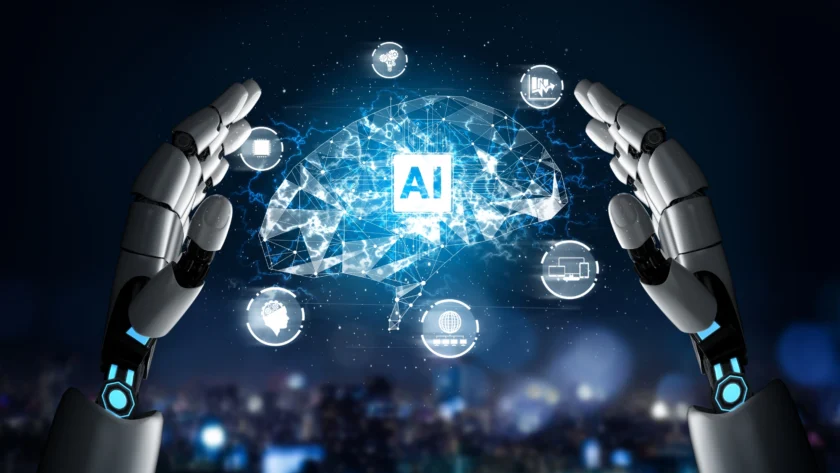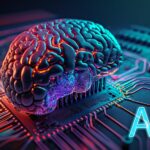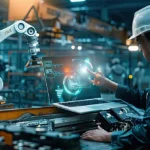Artificial Intelligence (AI) has become one of the most influential technologies of the 21st century, revolutionizing industries across the globe. From healthcare to finance, manufacturing to entertainment, AI is enhancing productivity, improving decision-making processes, and opening new avenues for innovation. While the benefits of AI are immense, it also comes with challenges related to ethics, data privacy, job displacement, and more. This article delves into how AI is transforming various sectors and the challenges it faces in the process.
How AI Is Transforming Various Industries
- Healthcare: AI is making significant strides in healthcare, where it is being used to improve diagnostics, personalize treatment plans, and streamline administrative tasks. Machine learning algorithms can analyze medical data, including images, to identify diseases such as cancer, heart disease, and neurological disorders with remarkable accuracy. For instance, AI-powered tools can analyze X-rays and MRIs faster and sometimes more accurately than human doctors, leading to earlier diagnosis and better patient outcomes. AI is also enhancing the precision of personalized medicine. By analyzing genetic information, AI systems can recommend tailored treatments based on an individual’s genetic makeup, improving the effectiveness of treatments and minimizing side effects. Additionally, AI-powered virtual assistants and chatbots are improving the patient experience by handling routine inquiries and scheduling appointments, saving time for healthcare professionals.
- Finance: In the finance sector, AI is reshaping everything from fraud detection to trading. AI-powered systems are used to identify unusual patterns in financial transactions that may indicate fraudulent activity. Machine learning algorithms can process vast amounts of data in real time, flagging suspicious transactions for further investigation, and potentially preventing financial crimes. In the realm of investment, AI is used in algorithmic trading to analyze market trends and execute trades faster than human traders. Robo-advisors, powered by AI, provide personalized investment advice, helping individuals and institutions make smarter financial decisions. Moreover, AI’s ability to predict market trends is giving rise to more sophisticated financial forecasting models, which help in managing risks and improving returns.
- Manufacturing: The manufacturing industry has embraced AI through automation, predictive maintenance, and supply chain optimization. In manufacturing plants, robots powered by AI can perform repetitive tasks with precision, reducing the need for human intervention and improving efficiency. AI-driven systems also monitor machinery and predict when equipment will need maintenance, preventing costly breakdowns and downtime. Additionally, AI is being used to optimize supply chains by predicting demand, managing inventory levels, and improving logistics. With AI, manufacturers can make real-time adjustments to production schedules, reducing waste and enhancing the overall production process.
- Retail and E-commerce: AI is transforming the retail and e-commerce industries by enhancing the customer experience and streamlining operations. Retailers use AI to analyze customer data, providing personalized recommendations based on past purchases, browsing history, and preferences. AI-powered chatbots are also being used to handle customer inquiries, assist with purchasing decisions, and provide real-time customer support. AI is improving inventory management by predicting which products will be in demand and ensuring that stock levels are optimized. In e-commerce, AI-driven algorithms can also optimize pricing strategies by analyzing competitor prices and market trends to set dynamic pricing, maximizing profit margins.
- Transportation: AI is revolutionizing the transportation industry, particularly through the development of autonomous vehicles. Self-driving cars, trucks, and drones are being tested and deployed, which could drastically reduce traffic accidents, optimize traffic flow, and transform logistics. AI-powered systems analyze data from sensors, cameras, and radar to make real-time decisions, allowing vehicles to navigate roads safely without human intervention. In public transportation, AI is being used to optimize routes and schedules, improving the efficiency of transit systems. AI also helps predict and manage traffic patterns, reducing congestion and environmental impact. Additionally, AI is aiding in the management of air traffic and cargo logistics, making travel and shipping more efficient.
- Entertainment and Media: The entertainment and media industry has seen significant changes with the advent of AI. Streaming platforms like Netflix and Spotify use AI algorithms to recommend content based on a user’s viewing or listening habits, enhancing the personalization of content offerings. AI also plays a key role in content creation, where algorithms can generate music, write scripts, or even assist in creating visual effects for movies. Moreover, AI is improving audience engagement by analyzing user behavior and preferences, enabling companies to tailor marketing strategies and enhance customer experiences. In gaming, AI-driven characters and environments provide players with more interactive and dynamic gameplay experiences.
Challenges Faced by AI
- Ethical Concerns: One of the most pressing challenges of AI is the ethical implications of its use. Issues such as bias in AI algorithms, where systems may perpetuate discrimination based on race, gender, or socioeconomic status, are significant concerns. For example, if AI is used in hiring or loan approval processes, it could unintentionally favor certain groups over others based on biased data used to train the systems. There are also concerns about the use of AI in surveillance, where facial recognition and tracking technologies could infringe on privacy rights and be used inappropriately for mass surveillance. As AI continues to advance, it is crucial to ensure that ethical guidelines are established to prevent misuse and to promote fairness in AI applications.
- Job Displacement: AI has the potential to displace jobs in several sectors, particularly those involving routine and manual tasks. Automation, powered by AI, could replace roles in manufacturing, customer service, and even some professional services. While AI creates new job opportunities in fields such as data science and robotics, there is a concern about how workers will transition to new roles and whether they will have the necessary skills. Governments and organizations must address this challenge by investing in reskilling and retraining programs to help workers adapt to the changing job market and find new opportunities in the AI-driven economy.
- Data Privacy and Security: AI systems rely heavily on vast amounts of data to function effectively. This raises concerns about data privacy and security. As AI systems collect, store, and analyze sensitive personal information, they create new targets for cyberattacks. Data breaches could expose individuals to identity theft or misuse of their private information. Stricter data privacy regulations and enhanced cybersecurity measures are needed to ensure that AI technologies are used responsibly and that personal data is protected. Governments, companies, and organizations must work together to create secure environments for AI to thrive without compromising user privacy.
- Lack of Transparency: Many AI systems, especially deep learning models, operate as “black boxes,” meaning their decision-making processes are not easily understood by humans. This lack of transparency makes it difficult to understand how AI arrives at certain conclusions, which can be problematic in critical areas such as healthcare or criminal justice. There is a growing demand for explainable AI, where the processes behind AI decision-making are transparent and understandable to ensure accountability and trust.
- Regulation and Accountability: As AI technology evolves rapidly, existing laws and regulations may struggle to keep up. Governments and international bodies are grappling with how to regulate AI to ensure its safe and ethical use. Without appropriate regulation, AI could be misused, leading to unintended consequences. The challenge lies in striking a balance between fostering innovation and ensuring that AI is used responsibly. Policymakers must collaborate with technologists to create frameworks that regulate AI’s development and application while promoting its positive potential.
Conclusion: The Future of AI
Artificial Intelligence is undeniably transforming industries and improving lives in countless ways, from revolutionizing healthcare to optimizing transportation and entertainment. AI’s ability to analyze vast amounts of data and make predictions is unlocking new possibilities for innovation, efficiency, and personalized experiences across sectors.
However, AI faces several challenges, including ethical concerns, job displacement, data privacy issues, and a need for transparent regulation. As AI continues to evolve, it is crucial that stakeholders—governments, industries, and the public—work together to address these challenges and harness AI’s full potential in a responsible and inclusive manner.
In the future, AI will undoubtedly become even more integrated into our daily lives, and its potential to drive economic growth, improve quality of life, and solve global challenges is vast. But, it is essential that we approach AI development and deployment thoughtfully to ensure it benefits everyone equitably and ethically.




